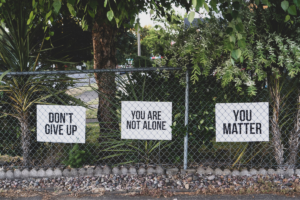The Reality of Human Trafficking
 As with any societal issue, widespread knowledge about human trafficking is a vital asset in the efforts to attenuate it. This means having the appropriate language, facts, and stories accessible in a way that we can readily talk about it. And, talk about it within our private and public discourse. Building these networks of communication tether us to reliable information and the lives most affected by this heinous abuse.
As with any societal issue, widespread knowledge about human trafficking is a vital asset in the efforts to attenuate it. This means having the appropriate language, facts, and stories accessible in a way that we can readily talk about it. And, talk about it within our private and public discourse. Building these networks of communication tether us to reliable information and the lives most affected by this heinous abuse.
There is a complex web of problems that make individuals and communities susceptible to the violence of human trafficking. The Episcopal Diocese of Atlanta and ECF support churches and organizations that address these issues. COVID-19 exacerbated these contributing crises and shifted the priorities of both governmental agencies and community collaborations away from anti-trafficking efforts.
ECF aims to mitigate human trafficking through funding, resources, and a reliable network of organizations directly tackling this issue. We understand that alleviating these intertwined issues is necessary to challenge this illicit industry that turns human persons into commodities.
While no means exhaustive, here are three key imperatives that promote an understanding of human trafficking, build solidarity with its survivors, and help prevent this modern form of slavery.
Know the facts and dispel the myths
Unfortunately, many myths surround the crisis of human trafficking. These misconceptions lead to the spread of misinformation and can downplay the issue’s gravity. It is important to note that many survivors were trafficked not by strangers, but by people they knew. This can include family members, romantic partners, and even spouses. Not all trafficking involves a violent kidnapping or physical coercion—sometimes, it’s instigated by psychological manipulation, deception, or financial pressures. And crucial to understanding the true scope of persons coerced into human trafficking is acknowledging that it affects Georgians of all ethnicities, genders, economic statuses, and nationalities.
Disabusing ourselves of these myths is an essential step toward responsible and informed public dialogue.
Listen to the stories of survivors
Stories are powerful for the listener and empowering for the teller. Stories engender empathy, allowing the listener to see from the teller’s perspective. At their best, stories create bonds of understanding and solidarity as both listener and teller fashion meaning together.
Theological ethicist Dr. Nichole Flores notes that human trafficking’s most basic violation is its denial of human agency. An ethical response to human trafficking includes restoring the survivor’s capacity to make decisions about their own lives and participation in “relationships characterized by mutuality, equality, and participation.”[1]
Polaris Project’s National Survivor Study is one such response that tackles human trafficking in mutual collaboration with survivors whose stories and experiences create a network of insight. The organization also serves as a platform for survivors to tell their stories. These windows into their lives further disabuse the public of our assumptions and promote human connection and personal agency—the very things survivors were denied.
Be proud
This summer’s Pride Month, June, was a time to remember the ongoing struggle and hard-won civic liberties of the LGBTQIA+ community and a time to communally celebrate and affirm this community.
Pride Month is important in the fight against human trafficking because of the disproportionate likelihood of members of the LGBTQIA+ community being exploited through sex and labor trafficking. This community is more likely to face job discrimination, harassment, family rejection, and financial instability. According to the Human Rights Campaign, “one in five LGBTQ people live in poverty, and 40% of homeless youth identify as LGBTQ”. This systemic disparity leads to desperate circumstances. Trafficking becomes more likely when there is nowhere else to turn for support and economic provision.
Given the widespread discrimination and abuse against the LGBTQIA+ community, the effort to prevent human trafficking takes the shape of proud support—especially for our youth. Pride Month is a reminder of the inherent dignity of all of God’s beloved children. And it is a reminder of the continual need to support, accompany, and advocate on behalf of those most susceptible to this modern form of slavery.
For the National Human Trafficking Hotline, call call 888.373.7888 or visit humantraffickinghotline.org.
[1] Flores, Nichole M. 2018. “BEYOND CONSUMPTIVE SOLIDARITY: An Aesthetic Response to Human Trafficking.” Journal of Religious Ethics 46 (2): 366–67.

